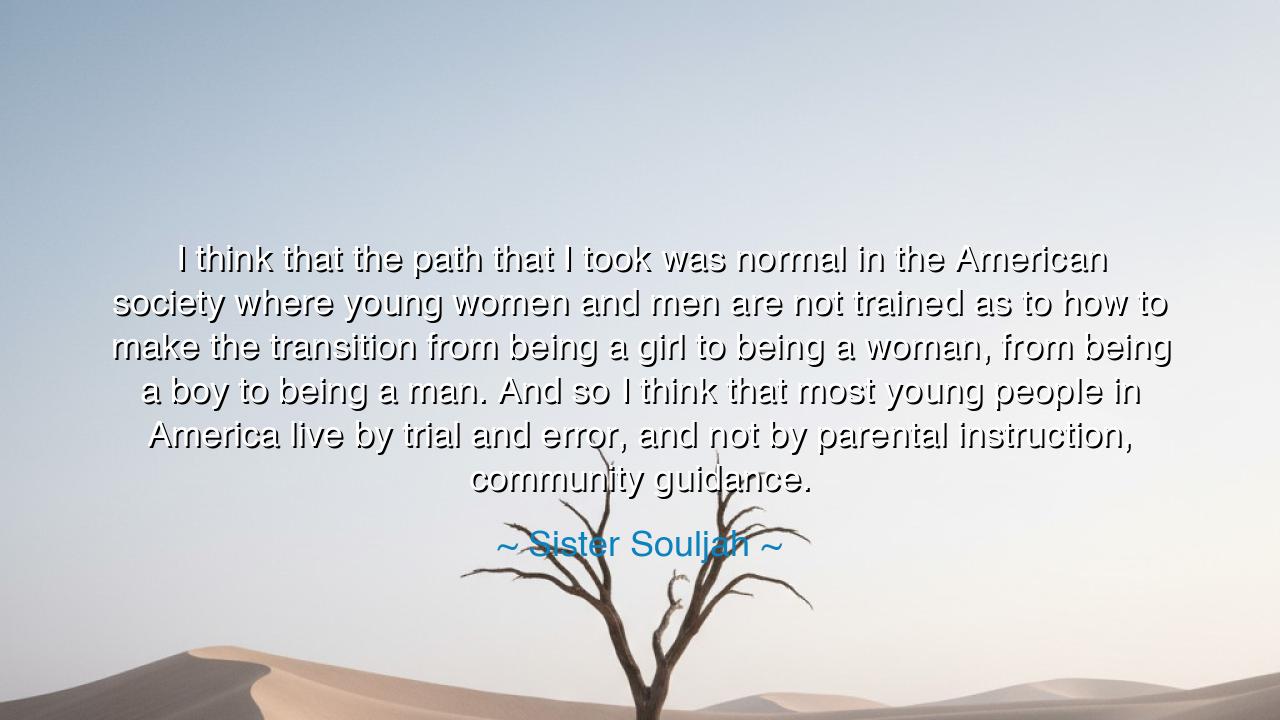
I think that the path that I took was normal in the American
I think that the path that I took was normal in the American society where young women and men are not trained as to how to make the transition from being a girl to being a woman, from being a boy to being a man. And so I think that most young people in America live by trial and error, and not by parental instruction, community guidance.






The words of Sister Souljah, “I think that the path that I took was normal in the American society where young women and men are not trained as to how to make the transition from being a girl to being a woman, from being a boy to being a man. And so I think that most young people in America live by trial and error, and not by parental instruction, community guidance,” pierce with the sorrow of truth and the fire of warning. Here she speaks of a wound that runs through modern life: the absence of clear rites of passage, the lack of wisdom passed from elders to youth, the abandonment of young souls to the wilderness of trial and error. What was once a guided journey into maturity has become a lonely wandering, where mistakes are the teachers and scars are the diplomas.
The origin of this truth lies in the collapse of communal traditions that once marked the sacred thresholds of life. In many ancient cultures, to become a man or woman was no vague, accidental process. It was guided by ceremony, by teaching, by the wisdom of parents and elders. A boy was taken into the company of men and taught strength, responsibility, and courage. A girl was honored by women who instructed her in resilience, dignity, and care. These moments of passage were community guidance embodied, ensuring that the young did not stumble blindly into adulthood but stepped forward with reverence, knowledge, and belonging.
History gives us powerful examples of such traditions. Among the Maasai of East Africa, young men underwent a rite of passage where they proved their courage and were welcomed into manhood with communal honor. Among the Jewish people, the Bar Mitzvah and Bat Mitzvah ceremonies marked the moment when a child became accountable before God and community. In Native American traditions, vision quests taught the young to discover purpose and responsibility through solitude and spiritual discipline. These were not mere rituals—they were maps for the heart, anchoring youth to the wisdom of their people.
But in modern American society, as Sister Souljah laments, these guiding structures have withered. Families too often are fractured, parents consumed by survival or distracted by their own struggles. Communities are fragmented, lacking the elders who once instructed and nurtured the young. And so, the children grow not through guidance, but through wounds. They stumble into adulthood carrying lessons won through pain: broken trust, failed love, wasted years. This is the cost of a society that has forgotten how to guide its children into maturity.
The meaning of her words is thus both personal and collective. For every young man who seeks manhood without instruction, there is a risk of violence or irresponsibility. For every young woman who seeks womanhood without guidance, there is a risk of exploitation or despair. Yet these are not inevitable destinies; they are the fruits of neglect. To restore a healthier path, society must again embrace the ancient wisdom: that the transition into adulthood is too sacred to be left to chance. It must be nurtured, protected, and honored.
The lesson is plain: do not leave your youth to be taught only by error. Parents, reclaim your role as teachers of life, not merely providers of bread. Communities, rise again as guardians of your young, creating spaces where wisdom is shared, and character is formed. And young people themselves must seek out mentors, must hunger for guidance, must refuse to let ignorance be their inheritance. The trial and error of life will always come, but it must not be the only teacher; it must be balanced by the living wisdom of those who have already walked the path.
Practical actions shine clearly. Families must make deliberate time for teaching, not only of skills but of values. Communities must create rites of passage anew—programs, ceremonies, and mentorship that guide the young with dignity. Elders must speak, even when their voices are not asked for, and youth must listen, even when the lessons seem hard. In this exchange, the sacred thread between generations is restored, and the wilderness of trial and error becomes instead a path of wisdom and strength.
Thus let Sister Souljah’s words be remembered as both lament and call. A society that abandons its youth to trial and error abandons its own future. But a society that guides its young with love, instruction, and community becomes strong beyond measure. For to teach a boy to be a man, or a girl to be a woman, is not only to shape an individual—it is to shape the destiny of a people. Let us not forget this ancient duty, lest we raise generations unanchored, unguarded, and alone.






AAdministratorAdministrator
Welcome, honored guests. Please leave a comment, we will respond soon